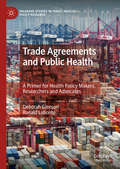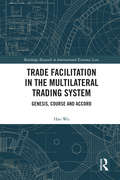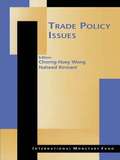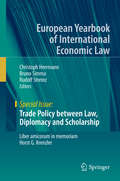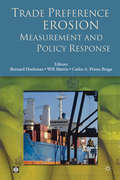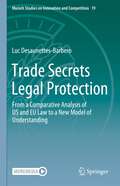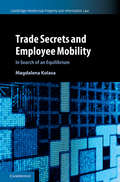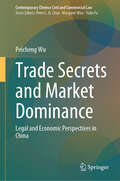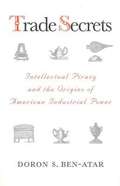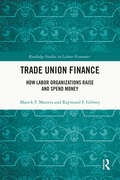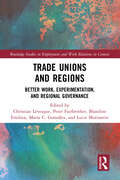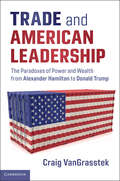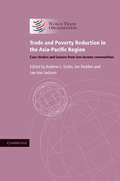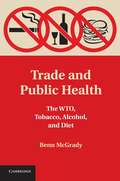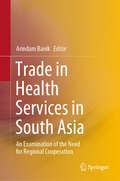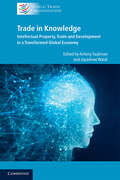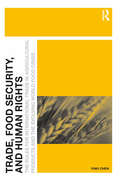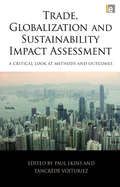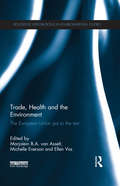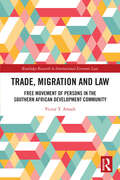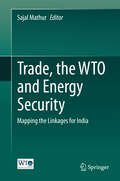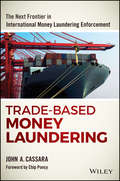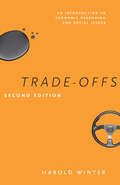- Table View
- List View
Trade Agreements and Public Health: A Primer for Health Policy Makers, Researchers and Advocates (Palgrave Studies in Public Health Policy Research)
by Ronald Labonté Deborah GleesonThe need for policy coherence between trade and health has never been greater, yet few public health workers are equipped to navigate this complex field. This book aims to fill this gap, providing a focused and readable introduction to the topic. It introduces the principles underpinning trade treaties and examines the implications of trade rules for health services and access to medicines, unhealthy commodities, labour rights and the environment. It explores the trade policy making process, methods for trade and health research, and recommendations for strengthening policy coherence.
Trade Facilitation in the Multilateral Trading System: Genesis, Course and Accord (Routledge Research in International Economic Law)
by Hao WuNegotiations on trade facilitation were concluded at the WTO 9th Ministerial Conference in 2013, and the Agreements on Trade Facilitation (TFA), therefore, became the first fully multilateral agreement in WTO history. Since then, trade facilitation has been in the limelight on the stage of the world trading system. During recent years, the TFA has been consistently on the agenda of the summits of G20, G7, and APEC. The Agreement has come into force and shall be implemented on a global scale. As a result, the WTO members shall be prepared to translate the Agreement into their domestic legislation, which will involve a series of reforms in trade laws and policies. There are extensive voices demanding a comprehensive expatiation on trade facilitation and the TFA. It is essential to systematically delve into the genesis of trade facilitation, revisit the course where the TFA came into being, and analyse the well-turned legalese of the TFA. This book meets this demand. This book is path-breaking in these aspects: it expounds on the rationales for trade facilitation and the significance of constituting an international accord on trade facilitation; it restores the one-century track of the international community’s talks on trade facilitation, from the times of the League of Nations to the WTO era; it reveals how the WTO negotiating mechanisms enabled the TFA to be nailed down, which would be enlightening for trade diplomats engaged in other WTO negotiations; and it provides an in-depth commentary on the TFA articles, which will help stakeholders more accurately understand and implement the Agreement. This book will be especially valuable for government officials and policy-makers, trade practitioners, lawyers, advisers, and scholars interested in international economic law, WTO law, international trade, international relations, and international development studies.
Trade Governance in the Digital Age
by Thomas Cottier Mira BurriThe development of new digital technologies has resulted in significant transformations in daily life, from the arrival of online shopping to more fundamental changes in the ways we work and communicate. Many of these changes raise questions that transcend market access and liberalisation, and demand cooperation and coherent regulatory design. International trade regulation has hitherto not reacted in a forward-looking manner to the digital revolution and, particularly at the multilateral level, legal engineering has yielded few tangible results. This book examines whether WTO laws possess the necessary flexibility and resilience to accommodate the changes brought about by burgeoning digital trade. By revealing both the potential and the limitations of the WTO framework, it provides a broad picture of the interaction between digital technologies and trade regulation, links the often disconnected discourses of international trade law, intellectual property and cyberlaw and explores discrete problems in different domains of global trade regulation.
Trade Policy Issues
by Chorng-Huey Wong Naheed KirmaniThe continued drift toward protectionism poses a threat to the balanced expansion of world trade in the medium term and to the prospects for suśtaining economic recovery. In the past several years, most industrial countries have become more protectionist than before, despite the continued tariff cuts of the Tokyo Round and limited instances of liberalization of nontariff barriers.
Trade Policy Issues and Developments
by Arne B. Petersen Shailendra J. Anjaria Naheed KirmaniThe continued drift toward protectionism poses a threat to the balanced expansion of world trade in the medium term and to the prospects for suśtaining economic recovery. In the past several years, most industrial countries have become more protectionist than before, despite the continued tariff cuts of the Tokyo Round and limited instances of liberalization of nontariff barriers.
Trade Policy between Law, Diplomacy and Scholarship
by Christoph Herrmann Bruno Simma Rudolf StreinzThis book presents 22 topical contributions on international trade law and policy, with a particular focus on EU external trade law, addressing countries ranging from Ukraine to Switzerland and the US (TTIP) and aspects from trade and IPRs to anti-dumping. The volume constitutes a state-of-the-art treatment of the many facets of trade policy in the 21st century from legal, diplomatic and academic standpoints. The book is dedicated to the memory of Horst Günter Krenzler, former Director General for External Relations for the European Commission and Chief Negotiator for the European Union in many trade negotiations, honorary professor of European Union law at the University of Munich and an of counsel with Freshfields' Brussels office after retirement from the Commission.
Trade Preference Erosion
by Will Martin Bernard M. Hoekman Carlos Alberto Primo BragaThe multilateral trade system rests on the principle of nondiscrimination. Unilateral trade preferences granted by developed countries can help beneficiary countries but can create tensions between 'preferred' developing countries-typically beneficiaries from pre-existing colonial regimes-and other developing countries. There is also concern about the potential erosion of these preferences through trade liberalization in the importing countries, an issue that has been important in the current negotiations under the Doha Development Agenda of the World Trade Organization. 'Trade Preference Erosion' provides the information needed to make informed assessments of the benefits of trade preferences for developing countries, the risks associated with the erosion of these benefits, and policy options for dealing with these problems. The authors provide detailed analyses of specific preference programs and undertake cross-country, disaggregated analyses of the impact of preferences at the product level. Understanding the likely impacts of these programs and how those impacts are distributed is a precondition for formulating appropriate policy responses. The authors argue that such responses need to go beyond trade policies and need to include a focus on enhancing the competitiveness and supply-side capacity of developing countries. This book is a useful and informative guide for policy makers, non-governmental organizations, and others who wish to better understand the debate on the magnitude and impact of preference erosion.
Trade Secrets Legal Protection: From a Comparative Analysis of US and EU Law to a New Model of Understanding (Munich Studies on Innovation and Competition #19)
by Luc Desaunettes-BarberoDespite the economic relevance of trade secrets, their legal protection is not based on a robust theoretical corpus, and a large uncertainty remains regarding how they should be legally apprehended. The present book investigates the foundations of their legal protection by assessing its justifications and aims to define how this legal apprehension should be organized.The book starts with a comparative analysis of the US and the EU legal frameworks. It demonstrates the parentship existing between the two systems of protection and highlights that the incremental structuring of trade secrets protection has led to legal systems lacking broad-based conceptual foundations. In both legal orders, trade secrets rely on blurred protection, formally anchored in unfair competition, the strength of which, however, comes closer to that offered by intellectual property law. In this convoluted architecture, the judiciary is required to play a decisive role, especially at the enforcement stage. However, the absence of clarity concerning the telos of trade secrets protection leads to legal uncertainty, potentially incoherent enforcement, and, all in all, to inefficient outcomes from a welfare perspective.The book then explores a theoretical framework based on a distinction between two legal objects: the undertakings’ secret sphere and secret pieces of information. Securing the undertakings’ secret sphere appears as a condition for the competition process to happen in an economy working under structural uncertainty. It requires objective regulations enforced by public authorities. On the other hand, the legal apprehension of secret pieces of information should be considered as falling within the realm of immaterial goods regulation aiming to solve the deficit of marketability of this type of good. This might call – after conducting a careful policy trade-off – for the establishment of relative (i.e. inter partes) subjective rights.
Trade Secrets and Employee Mobility: In Search of an Equilibrium (Cambridge Intellectual Property and Information Law #44)
by Magdalena KolasaIn the increasingly knowledge- and innovation-based economy in which the mobility of the workforce is vital, employees and ex-employees are considered to be one of the biggest threats to the existence of trade secrets. The interests of the former parties to the employment relationship are contradictory: employers want to safeguard their competitive position by limiting use of information, and employees want to use that information to pursue their professional career. Magdalena Kolasa analyses existing guidelines that determine the extent to which former employees may use information learned during service. She proposes criteria for a balanced enforcement of trade secrets, discussing the statutory and implicit confidentiality duties, contractual protection, and remedies. Drawing from the laws of Germany, UK, and USA, and considering the EU Trade Secrets Directive, this book advocates an approach which recognises the value and functions of trade secrecy both within companies and in the context of public policy.
Trade Secrets and Market Dominance: Legal and Economic Perspectives in China (Contemporary Chinese Civil and Commercial Law)
by Peicheng WuThis book explores the circumstances where the use of trade secrets may constitute the abuse of market dominance under competition law. Trade secrets have been valuable intangible assets for companies in the modern market. While it is imperative to protect trade secrets, noteworthy is that the exploitation of trade secrets may lead to anti-competitive concerns and may require antitrust intervention. By examining comparative experience from both sides of the Atlantic, this book provides specific suggestions for China’s competition authorities to handle anti-monopoly cases concerning trade secrets. This book is of interest for readers in the field of competition law and intellectual property law, particularly for those who are researching on the interaction between antitrust and intellectual property law.
Trade Secrets: Intellectual Piracy and the Origins of American Industrial Power
by Doron S. Ben-AtarDuring the first decades of America's existence as a nation, private citizens, voluntary associations, and government officials encouraged the smuggling of European inventions and artisans to the New World. At the same time, the young republic was developing policies that set new standards for protecting industrial innovations. This book traces the evolution of America's contradictory approach to intellectual property rights from the colonial period to the age of Jackson. During the seventeenth and early eighteenth centuries Britain shared technological innovations selectively with its American colonies. It became less willing to do so once America's fledgling industries grew more competitive. After the Revolution, the leaders of the republic supported the piracy of European technology in order to promote the economic strength and political independence of the new nation. By the middle of the nineteenth century, the United States became a leader among industrializing nations and a major exporter of technology. It erased from national memory its years of piracy and became the world's foremost advocate of international laws regulating intellectual property.
Trade Union Finance: How Labor Organizations Raise and Spend Money (Routledge Studies in Labour Economics)
by Marick F. Masters Raymond GibneyThere are few contemporary studies on the finances of unions. Indeed, little research exists on the internal operations of unions in the U.S. This book provides a comprehensive analysis of the financial resources and performance of the largest national unions. It discusses the theoretical and practical relevance of the topic, which goes directly to the formation, maintenance, and potential advancement of labor organizations. Financial capacity and performance create incentives for unions to mobilize at the grassroots level and launch major drives to improve their position in society. Understanding how unions raise and spend money provides insight as to their administrative orientation and organizational capacity. Given its topical breadth and depth, the book stands apart from the extant literature on unions in society. It is unique in the range of financial information presented, how data are analyzed, and its treatment of such important matters as compensation and benefits; operating budgets; political activism as measured by expenditures from treasury-based funds and political mechanisms funded by members through voluntary donations. The authors show not only the scope of union financial wherewithal and how it varies across labor organizations but also how such indicators compare to corporate entities who employ the rank-and-file. The book provides a wealth of information on how to analyze the finances of unions and to use this information to prepare for collective bargaining and other aspects of labor-management relations. It informs employers and other observers about how unions are able to represent members and their ability to withstand strikes.
Trade Unions and Regions: Better Work, Experimentation, and Regional Governance (Routledge Studies in Employment and Work Relations in Context)
by Christian LévesqueTrade Unions and Regions: Better Work, Experimentation, and Regional Governance is about the place of workers and their unions in the modern world. It addresses current challenges for unions working in regions and the experiments that may take place at this level of governance. The book addresses pressing questions concerned with the conditions for better work and a humane society. The focus is on the capacities of unions to address questions relating to regional governance, in both supranational and sub-national regions. It examines workers and their unions in a variety of contexts: multinationals, industries, workplaces, and communities. The authors address the experiments that can be initiated by unions, governments, or employers and the ways in which collective organisations engage to address these matters in regional contexts. The analysis takes as a starting point the fracturing and divisions evident in various regions, in Australia, Canada, Mexico, Spain, the United Kingdom, and USA. The contributors propose novel analyses with lessons for unions. It should be of interest to union activists and leaders, political parties, governments, and those who make decisions in and about regions. Researchers and students of labour markets, political mobilisation, and employment relations will take the analyses further.
Trade and American Leadership: The Paradoxes of Power and Wealth from Alexander Hamilton to Donald Trump
by Craig VanGrasstekFrom the days of Alexander Hamilton to the trade wars of Donald Trump, trade policy has been a key instrument of American power and wealth. The open trading system that the United States sponsored after the Second World War serves US interests by promoting cooperation and prosperity, but also allows the allies to become more independent and China to rise. The case studies in Trade and American Leadership examine how the value of preferential trade programs is undercut by the multilateral liberalization that the United States promoted for generations, and how trade sanctions tend either to be too economically costly to impose or too modest to matter. These problems are exacerbated by a domestic political system in which the gains from trade are unevenly distributed, power is fragmented, and strategies are easily undermined. Trade and American Leadership places special emphasis on today's challenges, and the rising danger of economic nationalism.
Trade and Poverty Reduction in the Asia-Pacific Region
by Lee Ann Jackson Jim Redden Andrew L. StolerThis book explores the complex relationship between international trade and poverty reduction through a combination of research papers and contemporary case studies. Written mainly by developing-country authors in consultation with local businesses and communities, the case studies contribute to our understanding of the ways in which low-income communities are dealing with trade as a practical challenge, especially in the Asia-Pacific region where approximately two-thirds of the world's poor live. While making it clear that there is no 'one size fits all' formula, the research and stories highlight a number of necessary preconditions, such as political commitment and cooperation at all levels, if trade is to successfully reduce poverty. Openness to trade, serious commitment to domestic reform, trade-related capacity building, a robust and responsible private sector and access to the markets of developed countries are all identified as powerful tools for building trade-related sustainable development.
Trade and Public Health: The WTO, Tobacco, Alcohol, and Diet
by Benn McgradyNon-communicable diseases, associated with risk factors such as tobacco consumption, poor diet and alcohol use, represent a growing health burden around the world. The seriousness of non-communicable diseases is reflected in the adoption of international instruments such as the WHO Framework Convention on Tobacco Control; the WHO Global Strategy on Diet, Physical Activity and Health; and the WHO Global Strategy to Reduce the Harmful Use of Alcohol. In line with these instruments, states are beginning to use measures such as taxes, restrictions on marketing, product regulation and labeling measures for public health purposes. This book examines the extent to which the law of the World Trade Organization restricts domestic implementation of these types of measures. The relationship between international health instruments and the WTO Agreement is examined, as are the WTO covered agreements themselves.
Trade in Health Services in South Asia: An Examination of the Need for Regional Cooperation
by Arindam BanikThis book observes that an in-depth study exclusively focusing on health service trade not only strengthens the overall services trade capacity of the South Asian region, but also promotes global as well as regional trade. There is a dearth of analytical research on estimating barriers to trade in health services, particularly in the context of South Asia, and as such, this book assesses the potential benefits and economic costs of barriers to trade in health services in select South Asian economies. It also analyzes the impact of liberalization and regulatory reforms on economic welfare. It broadly addresses issues relating to trade in health services, the GATS (General Agreement on Trade in Services), such as: Why are the current levels of trade in health services low? How will the GATS legally affect a country’s health policy? What effect might liberalization have on national health systems? And what are the likely benefits of greater trade in health services? It also provides specific answers to the following questions: Does the substantial role of the government in health – as health service provider, financial supporter, regulator and promoter – have implications for the treatment of the sector under the GATS? What is the impact of liberalization of international trade in health services on the quality and availability of health services in developing SAARC countries? Given the importance of consumption abroad for trade in health services, and the gradual opening of health markets through Modes 1 and 3 (cross-border supply and commercial presence), how can problems associated with trade in these Modes be prevented? And are these problems sufficiently addressed by GATS disciplines? Answers to these questions will be of great use to researchers, policy makers as well as practitioners and NGOs of South Asia.
Trade in Knowledge: Intellectual Property, Trade and Development in a Transformed Global Economy
by Jayashree Watal Antony TaubmanTechnological change has transformed the ways knowledge is developed and shared internationally. Accordingly, in the quarter-century since the WTO was established, and since its Agreement on Trade-Related Aspects of Intellectual Property Rights came into force, both the knowledge dimension of trade and the functioning of the IP system have been radically transformed. The need to understand and respond to this change has placed knowledge at the centre of policy debates about economic and social development. Recognizing the need for modern analytical tools to support policymakers and analysts, this publication draws together contributions from a diverse range of scholars and analysts. Together, they offer a fresh understanding of what it means to trade in knowledge in today's technological and commercial environment. The publication offers insights into the prospects for knowledge-based development and ideas for updated systems of governance that promote the creation and sharing of the benefits of knowledge.
Trade, Food Security, and Human Rights: The Rules for International Trade in Agricultural Products and the Evolving World Food Crisis
by Ying ChenMost scholars attribute systemic causes of food insecurity to poverty, human overpopulation, lack of farmland, and expansion of biofuel programs. However, as Chen argues here, another significant factor has been overlooked. The current food insecurity is not absolute food shortage, since global food production still exceeds the need of the entire world population, but a problem of how to secure access to resources. Distorted agricultural trade undermines world food distribution, and uneven distribution impedes people’s access to food, particularly in poor developing countries. Examining EU and US agricultural policies and World Trade Organization negotiations in agriculture, the author argues how they affect the international agricultural trade, claiming that current food insecurity is the result of inequitable food distribution and trade practices. The international trade regime is advised to reconcile trade rules with the consideration of food security issues. Several other enforceable solutions to reduce world hunger and malnutrition are also advanced, including national capacity building, the improvement of governance, and strategic development of biofuel programs. This book will be of great interest to agricultural trade professionals and consultant policy makers in the EU, US and developing countries. Students and researchers with a concentration on international trade, agriculture economics, global governance and international law will benefit greatly from this study.
Trade, Globalization and Sustainability Impact Assessment: A Critical Look at Methods and Outcomes
by Paul Ekins Tancrede VoituriezTrade liberalization, as promoted by the World Trade Organization (WTO), has become one of the dominant drivers and most controversial aspects of globalization. Trade sustainability impact assessments (SIAs) were introduced as a means of generating better understanding especially of the social and environmental impacts of trade liberalisation, and of making those impacts more consistent with sustainable development. This book takes a hard look at the experience of Trade SIAs to date, and the extent to which they have achieved their objectives and improved the outcomes of trade negotiations. It proposes several ways in which Trade SIAs could be made more effective, and illustrates these in respect of controversial sectors in which trade liberalisation has been implemented or proposed, including commodities, services and investment. Finally the book makes proposals beyond SIA through which some of the conflicts between trade liberalization and sustainable development could be more effectively addressed. Written by top researchers and experts on trade SIAs, this book is vital for researchers, academics, post-graduate students and policy makers working on any aspect of impact assessment, international trade or globalisation more generally. In addition, the book will provide a particularly useful background for those considering how the environment and trade interrelate at both global and regional levels, with some particular insights on climate change and trade policies.
Trade, Health and the Environment: The European Union Put to the Test (Routledge Explorations in Environmental Studies)
by Ellen Vos Michelle Everson Marjolein van AsseltThe trade conflicts that the EU has faced within the EU or WTO context demonstrate that the question of how to balance trade and other societal values in situations of uncertainty has not been solved by the regulatory model evolved by the EU in the aftermath of the BSE crisis – one which privileges processes of depoliticisation and scientification. This book addresses the current key dilemmas around science, law and the regulation of trade, both on a regime level and in the context of particular industrial sectors, e.g pharmaceuticals, climate change and nanotechnology. It will present possible future research avenues by looking at both theory and practice and learning from various disciplines (law and social sciences), legal realities (WTO, USA and EU) and actors (regulators, stakeholders, courts).
Trade, Migration and Law: Free Movement of Persons in the Southern African Development Community (Routledge Research in International Economic Law)
by Victor T. AmadiThis book explores how law and policy makers within the Southern African Development Community regional structure might reform the legal and regulatory frameworks to best capitalise the benefits of the movement of people, drawing lessons from other experienced jurisdictions by critically engaging with the regulatory efforts and approaches in regions such as the European Union, the Economic Community of West African States, and the East African Community to propose a revised approach to migration governance and practice in the SADC. Deeper regional integration allows citizens to move freely across national boundaries, and services are a rising component of global trade and investment. However, global trade in services is stifled by barriers at and behind the border. These barriers make it difficult for service providers from developing regions to access key markets in their preferred modes of service trade. Against this background, this book aims to take the discussion on furthering regional integration and trade through the movement of people by tackling issues on stringent immigration policies, arguing that having a vibrant and rewarding trade in services will require an approach towards the unrestricted movement of persons.
Trade, the WTO and Energy Security
by Sajal MathurThe linkages between WTO rules governing trade and energy security with a certain degree of focus on India are the main subject of this book. The edited volume brings together the views of academics, policymakers and experts with extensive experience covering WTO and international trade issues. The issues examined include mapping the linkages between trade and energy security in the WTO agreements, case law, accession and Doha negotiations; assessing the issues that could be raised by energy deficit or energy surplus countries at the WTO; analyzing the provisions of the ECT and NAFTA vis-à-vis the Indian policy framework and examining the trade regimes of selected OPEC members and other major suppliers of fossil fuels to India. While the Indian perspective is evident in the contributions, this book will also be of interest to an international audience, as trade, the WTO and energy security are global concerns and of relevance to all practitioners and academics working on these issues.
Trade-Based Money Laundering
by Chip Poncy John A. CassaraUncover the financial fraud that funds terrorist organizations Trade-Based Money Laundering is an authoritative examination of this burgeoning phenomenon, now coming under scrutiny in the War on Terror. This book walks you through the signs and patterns of trade-based money laundering (TBML) to help you recognize it when it occurs, and shows you how data and analytics can be used to detect it. You'll learn the common value transfer techniques including invoice fraud, over-and-under invoicing, and misrepresentation, and learn why analytic detection systems have yet to be implemented despite the existence of copious data. Case studies from around the world highlight the real-life implications of the concepts and processes presented in the text, giving you a first-hand view of the mechanisms at work inside this expanding illegal market. Trade-based money laundering uses trade to convert large quantities of illicit cash into less conspicuous assets or commodities to evade financial transparency laws and regulations. As an ideal funding mechanism for terrorist groups, the practice is getting more attention even as it increases in scale and spread. This book takes you deep inside TBML to better arm you against its occurrence. Learn the typical value transfer techniques of TBML Examine case studies detailing international examples Discover why institutions have failed to implement detection systems Explore ways in which analytics can identify TBML According to the U.S. State Department, TBML has reached staggering proportions in recent years, and is considered by many to be the next frontier of international money laundering enforcement. Trade-Based Money Laundering gives you a battle plan, with expert insight and real-world guidance.
Trade-Offs: An Introduction to Economic Reasoning and Social Issues
by Harold WinterWhen economists wrestle with issues such as unemployment, inflation, or budget deficits, they do so by incorporating an impersonal, detached mode of reasoning. But economists also analyze issues that, to others, typically do not fall within the realm of economic reasoning, such as organ transplants, cigarette addiction, overeating, and product safety. "Trade-Offs "is an introduction to the economic approach to analyzing these controversial public policy issues. Harold Winter provides readers with the analytical tools needed to identify and understand the trade-offs associated with these topics. By considering both the costs and benefits of potential policy solutions, Winter stresses that real-world decision making is best served by an explicit recognition of as many trade-offs as possible. This new edition incorporates recent developments in policy debates, including the rise of "new paternalism," or policies designed to protect people from themselves; alternative ways to increase the supply of organs available for transplant; and economic approaches to controlling infectious disease. Intellectually stimulating yet accessible and entertaining, "Trade-Offs" will be appreciated by students of economics, public policy, health administration, political science, and law, as well as by anyone who follows current social policy debates.
